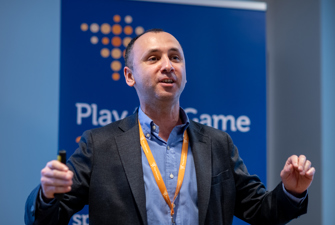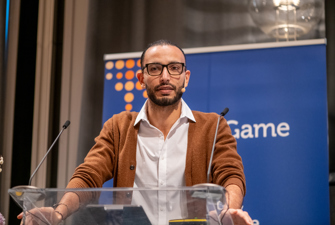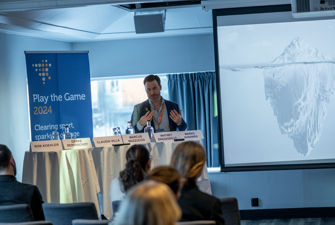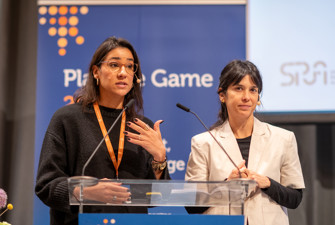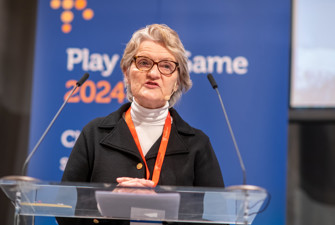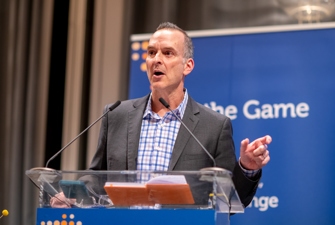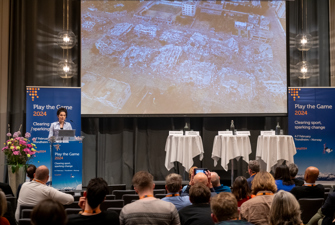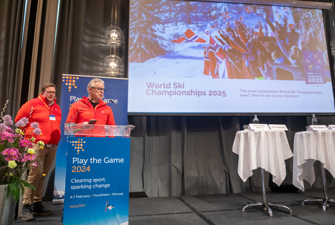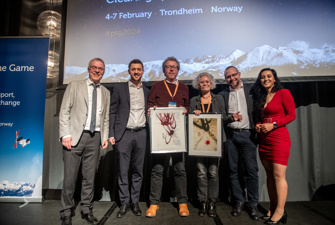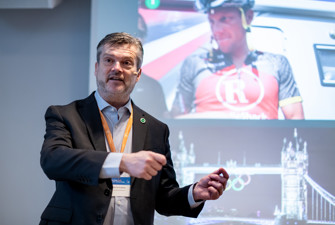Betting is a growing problem among the young populations in Africa
Betting companies are aggressively marketing options to bet in Africa from phone betting to turbo-charged computer games in betting shops. At Play the Game 2024, journalist Zoe Flood showed her documentary on gambling in Uganda which documents the harm betting causes.
Africa has a huge problem. Its young and growing population is an ideal target for global betting companies. In recent years these outfits have expanded their operations across the continent using aggressive marketing techniques.
The companies’ trump card is Africa’s passion for football. The European leagues are hugely popular, and gambling companies use this to attract punters. Many big European clubs are sponsored by betting companies, which gives the impression that football and betting are part of the same product.
In 2019, journalist Zoe Flood travelled to Uganda to make the acclaimed documentary 'Gamblers Like Me: The Dark Side of Sports Betting', which focused on the huge rise in gambling across Africa. Five years later, she attended Play the Game 2024 to show the documentary and give an update on the situation.
It is easy to bet, but very hard to make money from it
Collins Muhinda, the narrator of Flood’s documentary, used to be a compulsive gambler. Muhinda was accompanied by Flood’s film crew as he visited betting shops in his native Uganda, interviewing gamblers and their families.
These conversations brought home the ease with which people can fall into addiction and the devastation it can cause. Some have lost everything, Muhinda narrated, citing examples of gamblers using savings and tuition fees to feed their habit and even a case of suicide.
Uganda was chosen as the documentary’s location due to its large number of physical betting shops, which act as male social hubs with long opening hours. Elsewhere in the continent, betting via cell phone has never been easier.
Many people believe that they can make a living through gambling, Muhinda said in the film, a myth amplified by the marketing tactics of the betting companies.
Local celebrities are paid to promote gambling, while financial incentives are offered to entice new customers. Underage gamblers can easily place bets in physical shops, while many companies operate systems where agents are paid a commission to sign up new customers.
However, according to tax figures, pay-outs to African gamblers are lower than in other nations due to the poor value odds on offer. Although many gamblers believe the companies to be locally owned operators, they are often subsidiaries of big multinationals that shift profits out of the region.
In the film, the Ugandan government said it was working to improve regulation, and in January 2023 President Yoweri Museveni announced that no new licences or licence renewals would be issued to foreign-owned betting companies. In February 2024, two companies – 1XBet and Melbet – were forced to cease operations.
A problem primarily for men
When asked about the extent of problem gambling across Africa, Flood said that it was certainly greater than in Western countries.
“The figures are quite hard to come by, but a survey done on a group of 16-25-year-olds found that one in five could be termed a problem gambler,” she told Play the Game.
“This is very high compared to figures from the UK. It was difficult because it was a film about problem gambling so obviously, we were looking at those who were at the more extreme end. We didn’t really focus on those who didn’t have a problem.”
Flood said that she was conscious of the fact that the film featured very few women.
“However, this is to a large extent a male problem. The betting shops are almost entirely male-dominated. It was quite a difficult film to make in terms of access. As a woman, I was too disruptive to the environment at certain times.”
Virtual games provide quick dopamine hits
Flood also referred to so-called virtual games, which are becoming increasingly popular in Africa. Similar to traditional video games but played for a stake in betting shops, the games provide players with a “quick dopamine hit” through a digital match-up with a computer, typically a turbo-charged football match. They normally last only two or three minutes.
“I hadn’t really come across them before we made the film, and I was really surprised. Every betting shop we went into was running these virtual games, with football teams based on real teams. In reality, you are playing against a computer. I also saw virtual tennis and dog racing. It does seem like a particularly vulnerable area. It is almost like playing a slot machine. It’s a quick hit. “
While awareness of Africa’s gambling problem is growing, she said, resources appear lacking to tackle it on a large scale.
“As far as I am aware there is still no co-ordinated pan-African initiative to reduce gambling harm. All efforts seem to be at the local and grassroots level,” she said.
